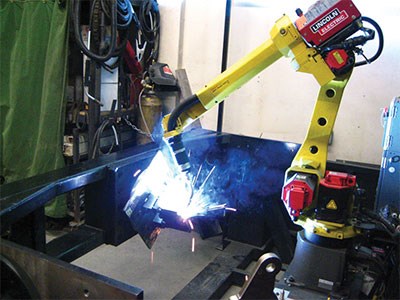Ask James Fedirchuk why he decided to start a high-tech fabrication shop in Kenora and he’ll probably scratch his head and wonder why, too.
“It doesn’t make a whole lot of sense some days,” said the owner of Fero Robotic Welding Solutions, while driving to an early morning business meeting in Winnipeg, some 200 kilometres away.
“It’s not the place to be doing robotic welding. But as far as lifestyle and being an enjoyable place to live, that’s why we did it; not for any business reason.”
All of his key clients and suppliers are on the Prairies, and it’s been a headache to find or train technicians for this highly skilled type of work in the scenic northwestern Ontario community of 15,000.
But as far as Fedirchuk is concerned, the pros outweigh the cons.
“It’s nice when you can come home after a 12-hour day and go on your boat or go fishing off the dock.”
Fedirchuk has made the tedious trip to Winnipeg numerous times when he worked as a technical rep for Lincoln Electric, a major manufacturer of automated welding products.
When the Trans-Canada Highway commute grew tiresome for this trained welding and mechanical engineer, he decided to start his own shop and convinced co-worker Jason Romas to join him.
Fero (a combination of their surnames) is a certified welding fabricator specializing in custom robotic welding fixtures and programming solutions. The three-employee company opened the doors on their 3,500-square-foot shop in April, 2011.
Though they pride themselves on staying on the leading edge of technology, in those early days they were either buying used equipment or building their own milling machines, cutting tables, lathes and drill presses.
To get the cash flowing, they took on whatever local fabrication work was available. Custom fire pits and ornamental work for Kenora’s well-heeled cottage crowd paid the bills for a while.
“But the welding robotics is where we’re solely focused on now, and it’s been working well,” said Fedirchuk.
From his former employer, he’s purchased the components for a welding cell, including the welder and robotic arm.
The bulk of the company’s jobs are with large agricultural manufacturers in Winnipeg, Saskatoon and Regina. Canadian grain harvests may be bumper or bust, but these companies sell machinery and parts globally.
For confidentiality reasons, Fedirchuk can’t name his clients or what specific jobs he performs for them, but it can involve handling heavy steel parts as long as 20 feet and weighing 3,000 to 5,000 pounds.
“The agricultural stuff is going through the roof right now with a bunch of good years,” said Fedirchuk. “There’s still a lot of room for us to grow without us having to go too far right now.”
Unfortunately, both human and shop space capacity in Kenora has forced them to decline additional work within the last year.
“We could use all sorts of machinists, drafters, and front office people. Ideally, we could hire 10 to 15 people and triple the size of the shop.”
With new mines being built in the northwest and the forest industry slowly rebounding, Fedirchuk is interested in latching onto those opportunities since robotic welding applications are suitable for constructing material handling systems.
“We’re more than willing to look at different applications, but right now we’re so busy and short-staffed as it is that it’s hard.”




